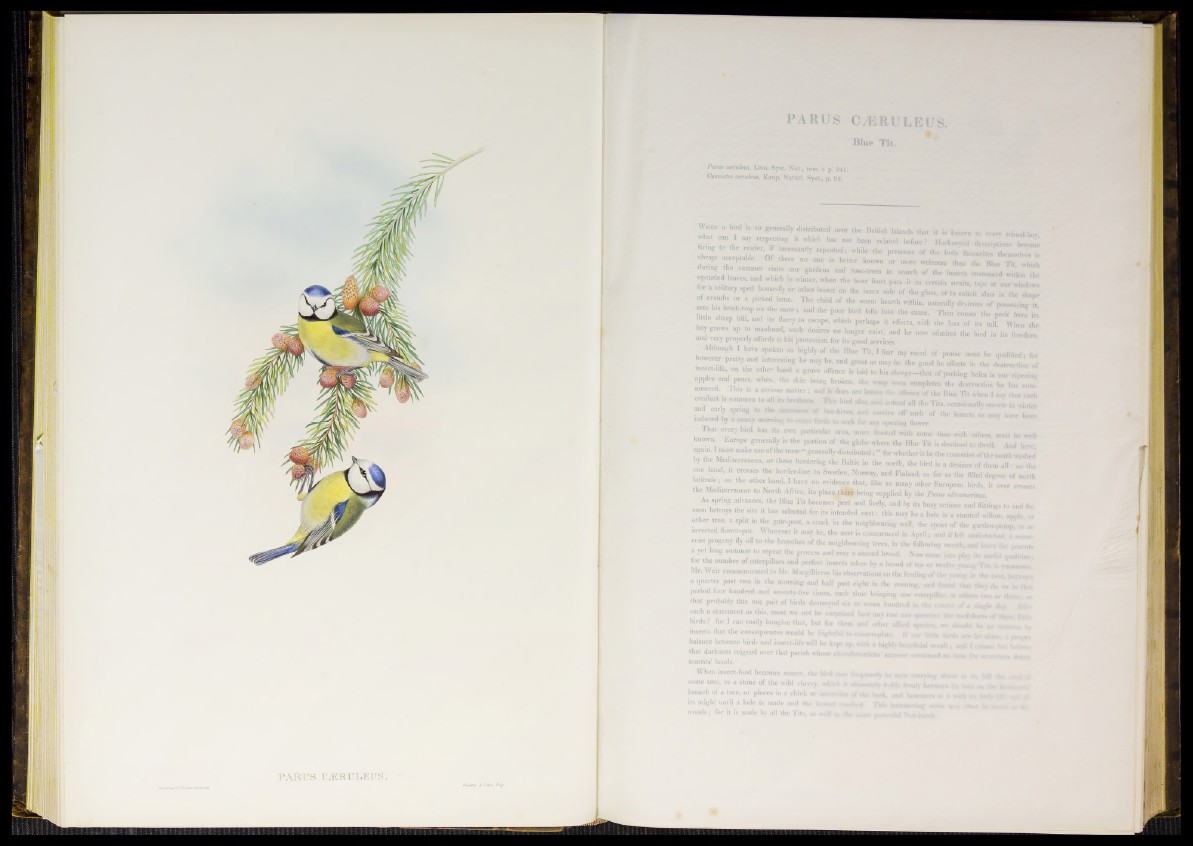
PARUS CÆ RU LE US.
" « u c f 1 1 .
Parus cceruleus, Linn. Syst. Nat., tom. i. p. 341.
Cyanistes caruletu, Kaup, Naturl. Syst., p. 99.
I T “ lT l iS “ ^ " ‘■'•ally di.s.ributed over the British Islands' that it is known to ever, school-bov
what can I say respecting it which has not been related before’ H-irl-mmd s.. - ,
tiring to the reader if incessantly repeated, while the presence o f the
always lid acceptable.I S,m,mT O f these no one is better known o r more welcome than the Bine T it which T : °Ur.garde"8 “d of *. insects ensconced w ith il the
p i l e d leaves, and which ,n wmter, when the hoar frost pnts it to certain straits, taps at onr windows
for a solitary sped house-fly o r other insect on the inner side of the glass, or to solicit aim, in the shape
o f crumb, o r a picked bone. The child of the warm hearth within, naturally desirous of possessing it
M e h 1 ' 7 P °a r Wi e P° 0 r bW fiUls int0 ,he snare- 1 V " oon.es the peck from its
, rp ' “ d f * "rT *° “ oopo- " ’inoli perhaps it effects, with the loss o f its tail. When the
boy grow, up to manhood such desires no longer exist, and he now admires the bird in its freedom,
and very properly affords it his protection for its good services.
Although I have spoken so highly o f the Blue Tit, I fear my meed o f praise must he qualified - for
iiiwct f f H interesting he may be, and great a , may be the good be effects in the destruction of
apples Z l r a f and ’d 1 pears, when, the ? skin f . * 1? being " 0ffence broken,!s la!the d *° h™ nlmrge that o f pecking hole, in onr ripening
completes the destruction be ha
menced. This is a serious matter; and it does not i<
i the offence o f the Blue Tit when I say that such
conduct is common to all its brethren. Tim bird also,
i indeed all the T its, occasionally resorts in winter
and early spring to the entrane«« « f bee-hives and
T ie s off such o f the insects as may have been
induced by a sunny morning to come forth to seek f o r ... . H pening B S I flower.
.
That every bird has its own particular area, more limited with some than with others, must be well
known Europe generally is the portion o f the globe where the Blue Tit is destined to dwell And here
again, I must make use o f the term •• generally distributed ; ” for whether it be the countries o f the south washed
by the Mediterranean o r those bordering the Baltic in the north, the bird is a denisen o f them all: on the
one hand, it crosses the border-line to Sweden, Norway, and Finland, as far as the 63rd degree o f north
'' ”de ’. ° ” the 0t ’" hand’ 1 bave " ° evidence that, like so many other European birds, it ever crosses
the Mediterranean to North Africa, its place, there being supplied by the / W «itramorimr.
As spring advances, the Blue T it becomes p ert and lively, and by its busy actions and flitting, to and fro
soon betrays the site it has selected for its intended n e s t: this may be a hole in a stunted willow amile
other tree, a split in the gate-post, a crack in the neighbouring wall, the spout o f the garden-pum , „
inverted flower-pot. Wherever it may be, the nest is commenced in April : and if left undisturbed a mime
rous progeny By ofTto the branches o f the neighbouring trees, in the following month, and leave tin- parents
a yet long summer to repeat the process and rear a second brood. Now come into plav it. useful qualities'-
for the number of caterpillar, and perfect insects taken by a brood o f ten or twelve voung Tits is enormo
Mr. Weir communicated to Mr. Macgillivray his observations on the feeding of the young in the nest, betwe.
a quarter past two in the morning and half past eight in the evening, aud found that they do to in that
period four hundred and seventy-five times, each time bringing one caterpillar, at others two or three
that probably this one pair of birds destroyed six or seven hundred in the cesiinc of a single ,1.
such a statement as this, must we not be surprised how any one can naewtion the usefulness o f lu _
birds ? for I can easily imagine that, but for them and other allied specie*, we should he s
insects that the consequences would be frightful to contemplate. If out liitle birds arc Kt ai
balance between bird- and insect-life will be kept up, with a highly benchcm! result ■ m
that darkness reigned over that parish whose church wardens’ account contained an item
tomtits’ heads'.
When insect-food becomes scarce, the bird ow*v trcqaenth be seen , . • u . o
some tree, o r a stone o f the wild cherrv, which « nhimiitrh bnkk firmly lu iiu . i. i f
branch o f a tree, o r places in a chink or interstice of the bark, ami Hammers «* it wit
its might until a hole is made and the kernel reached. This haimm-rimr ’»<»----- m
woods ; for it is made by all the Tits, as well a* the a u w >« ‘•■.»rf,.}